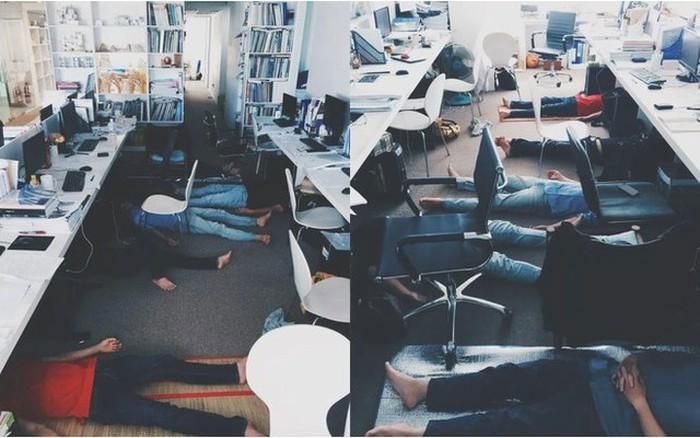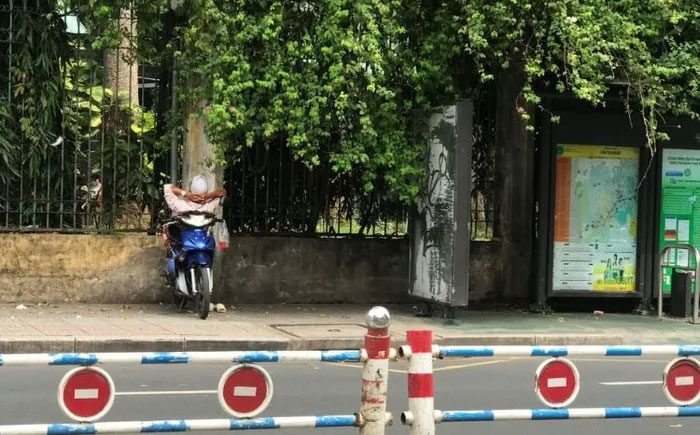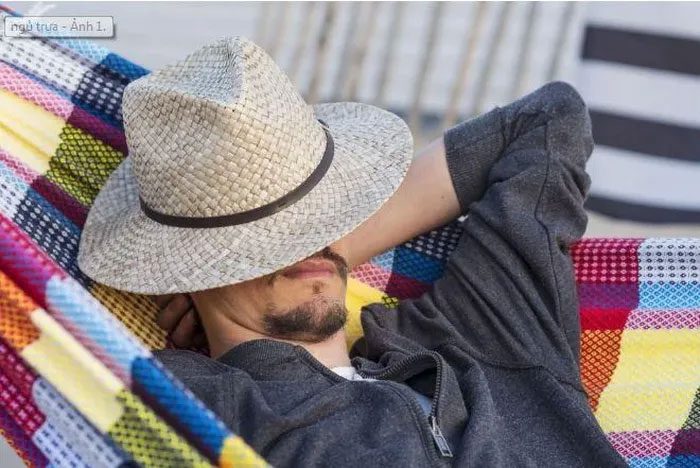Vietnamese people can even take naps on any “terrain” from sofas, floors, bike seats, to folding chairs…
Strange Culture
Siesta in Spanish means a nap or short sleep in the early afternoon.
In Spain (1 PM – 4 PM), Italy (1 PM – 3 PM), and Greece (2 PM – 4 PM), most shops close during this time for a rest. However, according to Maeil Business Newspaper (South Korea), napping in Vietnam is different from napping in Western countries.

Napping in Vietnam is different from napping in Western countries.
“During the day, when temperatures rise above 30 degrees Celsius, it is the perfect time to recharge with a short nap as work efficiency significantly decreases. In other words, it transcends simple customs and is a wisdom that Vietnamese people have practiced for a long time.”
Hong Seong-won, head of Hanjin Shipping’s office in Vietnam back in 2006, stated: “Initially, I was quite surprised to see local employees sleeping on mattresses on the floor after lunch, making it difficult for me to enter the office and forcing me to wander around.”
Even coach Park Hang Seo shared in Goodmorningvietnam, a Korean newspaper discussing life in Vietnam, that he was initially quite unfamiliar with the Vietnamese napping culture.
“A cultural trait of Vietnamese people is napping, which I didn’t understand at first. However, in my experience, napping when it’s hot is effective, thus improving training quality. Now, I also often take a short nap,” he said.
The Korean newspaper noted that napping in Vietnam is a social phenomenon that can be found everywhere.
According to a local resident sharing with Maeil Business Newspaper: “Most pedestrians under the hot sun are foreigners, including Koreans.”

A motorbike taxi driver sleeps on his motorcycle in Vietnam. (Photo: Care Connect Vietnam).
“Incidents in the Dark”
The Japanese do not have a habit of napping, but in recent years, the people of the Land of the Rising Sun have somewhat changed their napping habits. Some companies have designed additional rest rooms, encouraging employees to take naps because short naps of about 30 minutes can improve work efficiency.
Nagiho Watanabe, an employee of the Japanese group AGS in Vietnam, revealed that when he first arrived in Vietnam, he was quite surprised by the Vietnamese napping culture.
“After we finished lunch, the lights in the office gradually turned off, and we noticed that nearly 90% of Vietnamese employees had gone to sleep. After observing them for a few days, I realized that most people brought pillows, mattresses, blankets, and eye masks… to the office as napping equipment.”
Watanabe added: “In the city, I often see many people sleeping soundly on motorcycles or napping in hammocks, which is also a very common phenomenon. Additionally, many items for napping (pillows, eye masks, blankets…) are sold in many places such as shops and markets in the city.
I’m not sure if those items are necessarily for napping, but from the company’s situation, I guess many people use them for napping.”
On its information page, the Japanese software company based in Vietnam, Care Connect Vietnam, also showed great interest in the Vietnamese napping habit.
“When thinking about a short nap, you might envision sleeping on a soft surface like a mattress or sofa.
However, if you stroll around Vietnam, you will see people sleeping on any terrain. The balancing act of motorbike taxi drivers napping on their bikes is quite impressive, as is the sight of them parking under tree shade or awnings of buildings to take a nap.“
Napping Benefits for Health

Short naps of about 30 minutes can improve work efficiency.
According to The New York Times, a study published in 2007 by researchers at Harvard University’s School of Public Health indicated that individuals who regularly nap for 30 minutes have a 37% lower risk of dying from heart disease over a six-year period compared to those who never nap.
Some studies have also shown that the rate of adults in the Mediterranean dying from heart disease is lower compared to Americans and Northern Europeans, partly thanks to the potential role of napping as sleep at any time of day serves as a valve to release the stress of daily life.
“We all know that the three pillars of health are diet, exercise, and sleep, and sometimes people forget the importance of sleep,” said Dr. Alex Chediak, who worked at the American Academy of Sleep Medicine.
Nighttime sleep has been studied much more thoroughly than short naps. However, researchers believe that the benefits of nighttime sleep also accumulate from short naps.
American expert Michael Twery revealed: “The human biological clock has two cycles each day, with two drops. For most people, one of those drops occurs right after lunch. This is a time when many people may feel a bit sleepy and less alert.”
Dr. Manolis Kallistratos, a cardiologist at Asklepieion Voula General Hospital in Athens, emphasized: “Due to the 9 AM to 5 PM work culture and busy daily life, napping has now become a routine, almost a privilege.”
A U.S. company has even upgraded its napping rooms, equipped with full-body massage chairs combined with aromatherapy and motion. It can simulate the sounds and scenery of the beach or the trickle of a stream.





















































